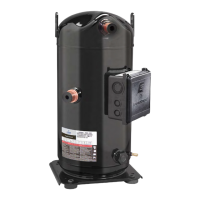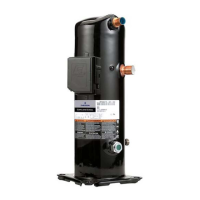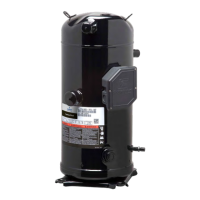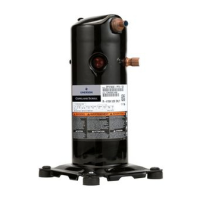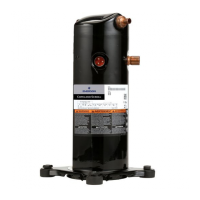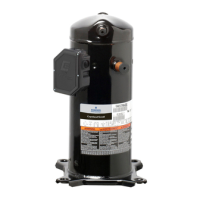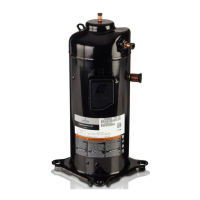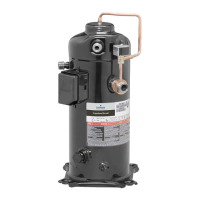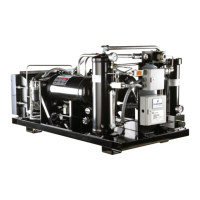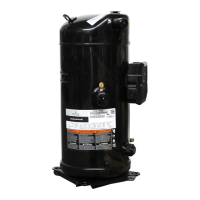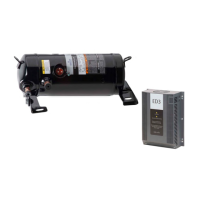5
© 2016 Emerson Climate Technologies, Inc.
AE4-1303 R15
Advanced Scroll Temperature Protection (ASTP)
A Therm-O-Disc
™
temperature-sensitive snap disc
provides compressor protection from discharge gas
overheating. Events such as loss of charge, evaporator
blower failure, or low side charging with inadequate
pressure will cause the discharge gas to quickly
rise above a critical temperature. Once this critical
temperature is reached, the ASTP feature will cause
the scrolls to separate and stop pumping but allow the
motor to continue to run. After the compressor runs for
some time without pumping gas, the motor overload
protector will open. Depending on the heat buildup in
the compressor, it may take up to two hours for the
ASTP to reset. The addition of the Advanced Scroll
Temperature Protection makes it possible to eliminate
the discharge line thermostat previously required in
heat pump applications. A graphic explanation and a
short video clip are available on our website at www.
emersonclimate.com/ASTP. Compressors in this size
rangethathaveASTPareidentiedwiththeASTPlabel
shown in Figure 4.
Discharge Line Thermostat
A discharge temperature thermostat is not an application
requirement because of the built-in ASTP feature that
protects the compressor against abnormally high
discharge temperatures. If the system designer wants to
prevent ASTP trips and limit the maximum compressor
discharge temperature to a lower temperature, a
discharge temperature switch should be used. Table 4
lists available discharge line thermostats that strap on
to the discharge line of the compressor for the highest
level of compressor reliability.
High Pressure Control
A high pressure cut-out control must be used in all
applications. The maximum cut out setting is 425 psig
(30 bar) for R-22, R-407C, and R-134a and 650 psig
(45 bar) for R-410A. The high pressure control should
have a manual reset feature for the highest level of
system protection.
Low Pressure Control
A low pressure control is highly recommended for loss
of charge protection and other system fault conditions
that may result in very low evaporating temperatures.
Even though these compressors have internal discharge
temperature protection, loss of system charge will result
in overheating and recycling of the motor overload
protector. Prolonged operation in this manner could result
in oil pump out and eventual bearing failure.
The low pressure cut-out setting will depend on the
application type and minimum expected evaporating
temperature. The low pressure cut-out should be
selected to prevent compressor overheating and other
system failure modes such as coil icing in air conditioning
systems and frozen heat exchangers in chiller systems.
The minimum, recommended low pressure cut-out switch
settings are:
Air conditioning and chiller:
55 psig/3.8 bar (R-410A)
25 psig/1.7 bar (R-22 & R-407C)
10 psig/0.7 bar (R-134a)
Heat pumps:
20 psig/1.4 bar (R-410A)
10 psig/0.7 bar (R-22, R-407C, & R-134a)
Shut Down Device
All scrolls in this size range have floating valve
technology to mitigate shut down noise. Since Copeland
Scroll
™
compressors are also excellent gas expanders,
they may spin backwards for a brief period after
shutdown as the internal pressures equalize.
Discharge Check Valve
A low mass, disk-type check valve in the discharge
ttingofthecompressorpreventsthehighside,high
pressure discharge gas from owing rapidly back
through the compressor after shutdown. This check
valve was not designed to be used with recycling pump
down because it is not entirely leak-proof.
Discharge Mufers
Flow through Copeland Scroll compressors is semi-
continuous with relatively low pulsation. External
mufflers, where they are normally applied to
piston compressors today, may not be required for
Copeland Scroll compressors. Because of variability
between systems, however, individual system tests
should be performed to verify acceptability of sound
performance.Whennotestingisperformed,mufers
arerecommendedinheatpumps.Themufershould
be located a minimum of six inches (15 cm) to a
maximum of 18 inches (46 cm) from the compressor
forthemosteffectiveoperation.Thefurtherthemufer
is placed from the compressor within these ranges the
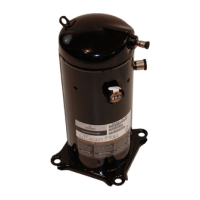
